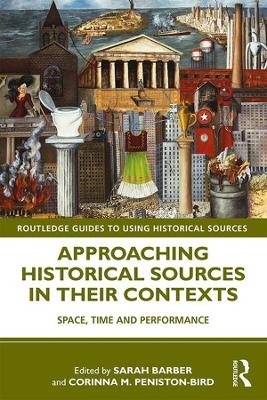
Approaching Historical Sources in their Contexts
Routledge (Verlag)
978-0-8153-6481-8 (ISBN)
In Approaching Historical Sources in Their Contexts, 12 academics examine how space, time and performance interact to co-create context for source analysis.
The chapters cover 2000 years and stretch across the Americas and Europe. They are grouped into three themes, with the first four exploring aspects of movement within and around an environment: buildings, the tension between habitat and tourist landscape, cemeteries and war memorials. Three chapters look at different aspects of performance: masque and opera in which performance is (re)constructed from several media, radio and television. The final group of chapters consider objects and material culture in which both spatial placement and performance influence how they might be read as historical sources: archaeological finds and their digital management, the display of objects in heritage locations, clothing, photograph albums and scrapbooks. Supported by a range of case studies, the contributors embed lessons and methodological approaches within their chapters that can be adapted and adopted by those working with similar sources, offering students both a theoretical and practical demonstration of how to analyse sources within their contexts.
Drawing out common threads to help those wishing to illuminate their own historical investigation, this book encourages a broad and inclusive approach to the physical and social contexts of historical evidence for those undertaking source analysis.
Sarah Barber is Senior Lecturer in History at Lancaster University, UK. She publishes widely on early modern Britain, Ireland and the colonial Americas. Her recent work reconfigures colonialism, decolonising the writing of colonial encounter, such as in the monograph, The Disputatious Caribbean (2014). Recovering the voices of the silent and silenced spurs her work to expand historical source material. Corinna M. Peniston-Bird is Senior Lecturer in Gender and Cultural History at Lancaster University, UK. She works on experiences and cultural memories of war, focussing largely on the World Wars. Her interests lie in the disruptive, the excluded and the marginalized and the sources which allow historians that focus. Her recent publications have explored British memorials, wartime cinema and the significance of wartime memories of bananas.
Introduction 1 Building: Constructing Identities 2 Landscape: Consuming Natural Places 3 Cemeteries: Tracing Sepulchral Cultures 4 Memorials: Associative Meanings 5 Masque and Opera: Staging Performance 6 Radio: Listening to the Airwaves 7 Television: Capturing Performance 8 Digital Surrogates: Archaeological Materialities 9 Objects: Dynamics of Display 10 Clothing: Reading what was Worn 11 Photo Albums: Autobiographical Narrations 12 Scrapbooks: Proliferations of Meaning
| Erscheinungsdatum | 04.05.2020 |
|---|---|
| Reihe/Serie | Routledge Guides to Using Historical Sources |
| Zusatzinfo | 34 Illustrations, black and white |
| Verlagsort | New York |
| Sprache | englisch |
| Maße | 156 x 234 mm |
| Gewicht | 480 g |
| Themenwelt | Geisteswissenschaften ► Geschichte ► Allgemeine Geschichte |
| Geisteswissenschaften ► Geschichte ► Geschichtstheorie / Historik | |
| Geschichte ► Teilgebiete der Geschichte ► Kulturgeschichte | |
| ISBN-10 | 0-8153-6481-4 / 0815364814 |
| ISBN-13 | 978-0-8153-6481-8 / 9780815364818 |
| Zustand | Neuware |
| Informationen gemäß Produktsicherheitsverordnung (GPSR) | |
| Haben Sie eine Frage zum Produkt? |
aus dem Bereich


